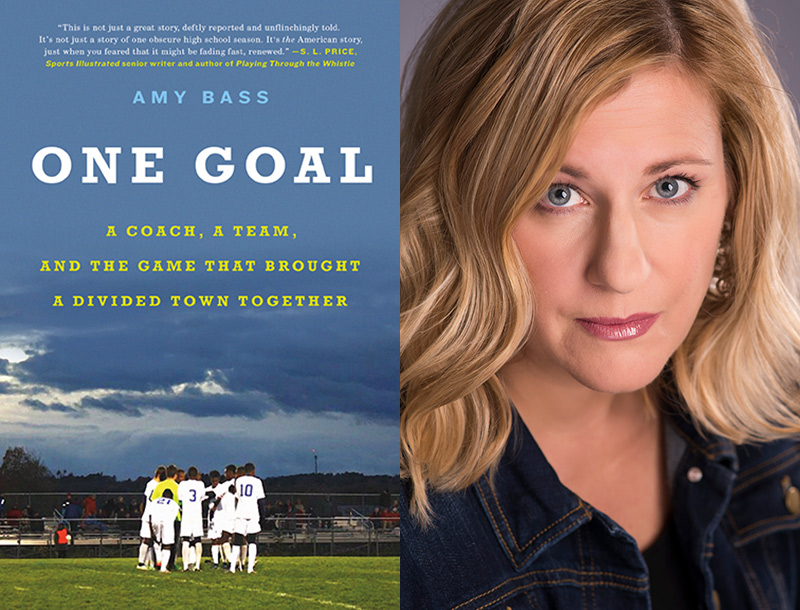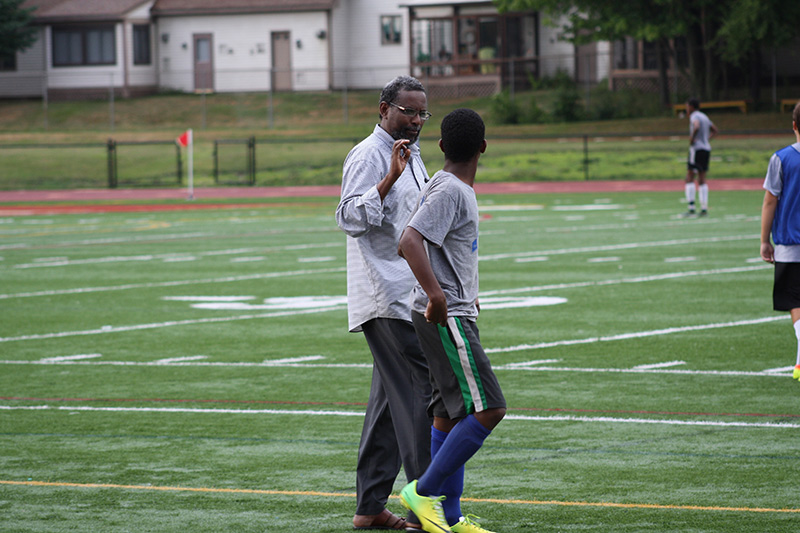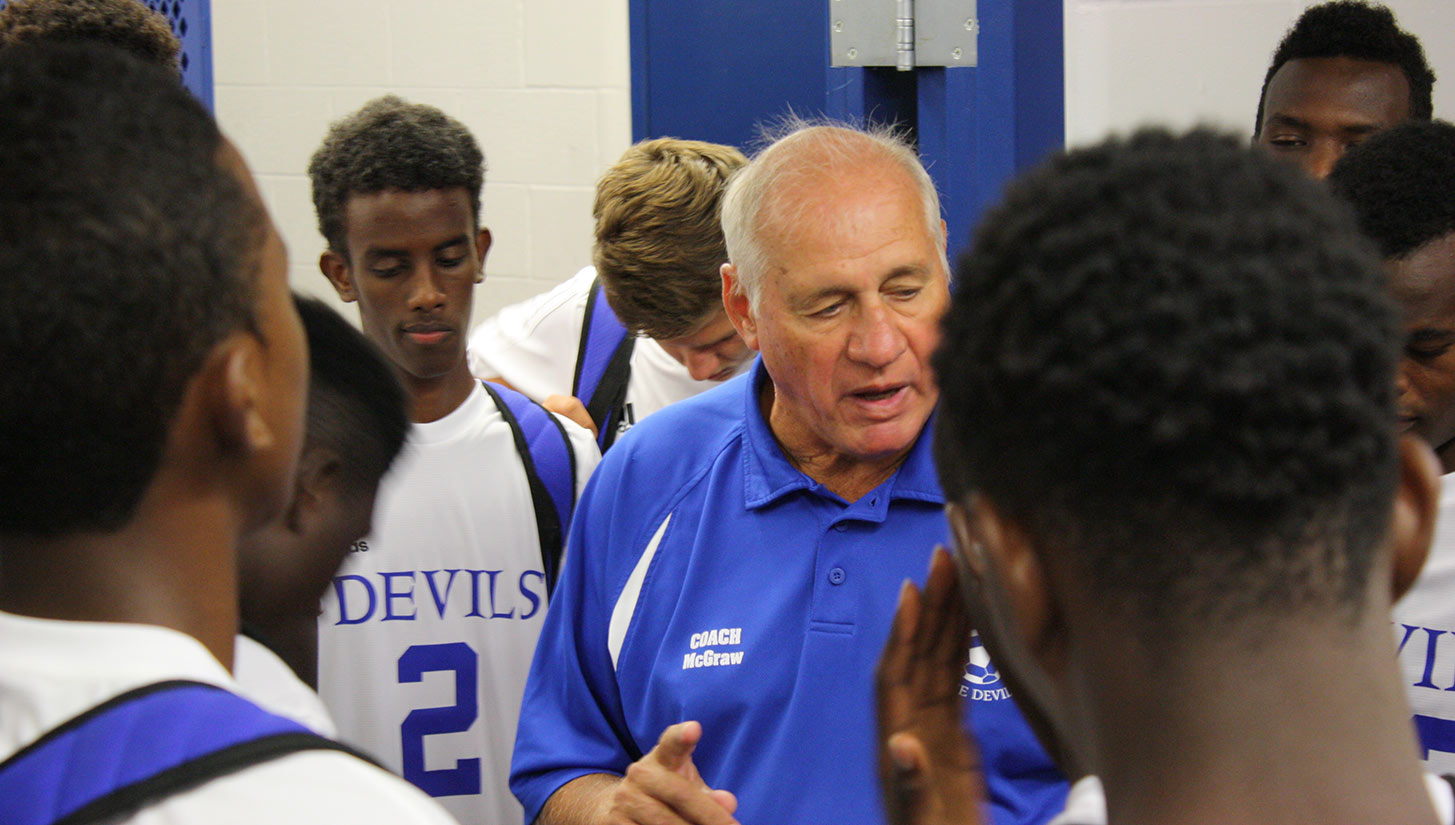Chronicling the ups and downs of the refugee-led Lewiston High School soccer team’s run to a state championship, Amy Bass’ One Goal has been lauded by critics and sports fanatics alike as a masterful work of storytelling. We sit down with the Emmy-winning writer to discuss the fascinating stories behind the book’s characters and soccer’s natural healing properties.
Soccer is a worldwide phenomenon for a reason. Its sheer power is highlighted in communities across the globe, including the small town of Lewiston, Maine — where the local high school soccer team has made an impact beyond the chalk lines of the pitch. Largely made up of African immigrants, the Lewiston Blue Devils have won three out of the last four state championships, uniting a chasmed blue collar community in the process.
This success did not come without adversity and finally came to a head during the 2015 season, when the Blue Devils won their first-ever state championship. The team’s journey is chronicled by Amy Bass in her book One Goal, which was recently reissued in a paperback edition and was also optioned by Netflix for an upcoming project.
Over a 10-year span, Lewiston became home to nearly 7,000 African immigrants — a massive shift that wasn’t necessarily welcomed by all of its residents. Figuring out how to unite the community through cultural and religious differences was not an easy process, but at the heart of it all was soccer.

The immigrants carried their homegrown passion for the beautiful game with them as the children used it as an escape from tragedy that continued to haunt them even after their journey across the Atlantic Ocean. Immigration was a hot button issue at the time, as the aftermath of the 2015 attacks in Paris raised alarm for terrorism worldwide. The message of community unity rings just as powerful today as people flee to America seeking a better life, but aren’t always embraced with open arms.
With World Refugee Day coming up on June 20, we spoke with Bass about her process for the book, the institutionalization of soccer versus the grassroots game, and how the kids are doing after finishing high school as Lewiston Blue Devils.
Urban Pitch: How did you initially hear about Lewiston and everything that was happening in the town?
Amy Bass: I went to college in Lewiston many years ago. When you go to Bates College, Lewiston’s always sort of on your radar. A friend who still lives in Maine posted about the team on Facebook, and it was at a really opportune political time. It was when there was a lot of rage emerging in the United States about refugees relocating to the U.S. in the wake of the terrorist attacks in Paris.
This was back in fall 2015, when rumors were spreading that refugees had done the Paris attacks — which was not true — and Obama’s plan in terms of Syrian refugees who were trying to flee terrorism. One of those governors who came forward and said, “Refugees aren’t allowed in my state,” was Paul LePage in Maine. That’s when I first wrote about it. There was this fear of refugees that was emerging and these absurd things that governors were saying about relocation, and then the beautiful game being played by these guys in Lewiston. So that’s really the sequence that put them on my radar and then made me want to write about them.
It’s crazy how the topic of the book is more relevant today.
It’s really bittersweet in a lot of ways. You always want to write about something topical and current. It can be overwhelming. There were a lot of moments during the writing process where I would call my editor and be like, “We have to finish this now. It has to come out right now.” He’d respond, “I have a feeling it’s going to get worse, so just keep doing what you’re doing and it’ll come out when it comes out.” Yeah, it’s crazy what the dialogue about immigrants and refugees and borders has become in the United States.
Lewiston is obviously a smaller town, but how do you think it can be an example for cities dealing with racial tension and accepting refugees?
It is a small place, but when you look at the number of immigrants and refugees that have settled there in the last 15 years or so, the per capita increase is kind of amazing to wrap your head around. So I think that the size of the community isn’t as important as the hard work that the community is doing. The takeaway for other communities is that your community isn’t just a place to live in, that’s your location. Your community is the place that you have to contribute to and it’s hard work. You can’t take it for granted.
I think that Lewiston is a really good story to follow because it’s not all progress. There’s forward steps, there’s backward steps. There’s fractures, there’s coming togethers. The big cast of characters in this book are soccer players, coaches, volunteers, community organizations, teachers, and school administrators. There’s so many hands that are needed to make a community work and thrive, and to not just tolerate or even embrace difference when it knocks on your door, but to capitalize on it. Because that’s really what this team shows — is how you can capitalize on bringing different people from different places together.
Soccer’s unifying power is well documented, and the book’s story is a shining example of it. Can you go into more detail about the game’s role specifically in Lewiston?
We always talk about the melting pot in the United States, which is a really poor metaphor, because that would say that we all become the same thing. I think one of the things that we see in Lewiston is that there’s negotiations going on from all sides. This is a championship hockey town that makes room for soccer. It’s not hockey or soccer, it’s hockey and soccer and the community is all the richer for it. I’ve said this a lot — I don’t think it’s an accident that soccer’s at the center of this story because it’s a game played continuously without fracture. It’s based on this crazy concept of this enormous landscape and you’re going to move a ball across it together. I think that Coach McGraw, Coach Abdi, Coach Hersi and all of those folks really understood that if they stuck to the rules of the game, a lot of good could come out on the field and off the field.
“The beautiful thing about soccer is it’s the most accessible game in the world. When I talk to these kids about their earliest memories of playing soccer, it all goes back to the refugee camps. They didn’t have balls, they created balls.”
Besides the coaches, were there any unexpected leaders that wouldn’t normally be highlighted that stood out to you while writing this book?
Sure, I think there’s two figures that stick out in particular. I think that I wrote far more about the school system than I thought I was going to. Within that, there was the usual things to be expected, the English language learning classes being added and adjusting things for different customs and different religions. But on top of that, there is athletic director Jason Fuller, who has to figure out how to network with the community in order to get things that we might think are so simple — getting a physical done or getting a permission slip signed — explained and understood to community volunteers in order to make for a good team effort. So I looked at people like the athletic director and community volunteers more than I thought I was going to.
The head coach Mike McGraw, the giant personality — he’s an amazing storyteller, but then you have people like Abdullahi Abdi, the eighth grade coach. I think in the book I describe him as “the coach of everyone,” which is how everyone talks about him. Someone who has a real partnership with every team, whether it’s a rec team or a travel team or a club team or the high school team. So sort of walking away a little bit from the people who are in the official positions of the game and looking at the folks who are working with kids on the street, who are at the pick-up games.
The pick-up soccer games, the street soccer games in Lewiston are a sight to behold. There’s a Ramadan tournament that they create each year so that they can observe the final hours of fasting before Iftar each night while they’re playing soccer. Those are the folks that I’m so grateful I got to know and helped me so much and were so patient with my millions of questions about so many things.

We recently did a piece on racism in soccer and the role that some of the organizations have to sanction fans or help bring more awareness to show that racism is unacceptable in the game. You addressed how FIFA sanctioned Somalia for civil war in the book, but from your perspective what role do governing institutions have to condemn issues like racism versus the personal responsibility of people?
I wrote a piece when the real FIFA storm happened, when people were being pulled out of fancy hotels in Switzerland. I wrote that I kept thinking about the kid who’s at home playing FIFA in his or her living room, and what kind of an example does FIFA have to show about that?
What kind of example are the bigger governing bodies supposed to show? I think that all sports have to deal with this. First of all, we’re seeing the slow and rapid implosion of USA Gymnastics for example, also with the IAAF in terms of gender verification. FIFA’s so gigantic and so powerful that I think it has so much potential to do good, but it fails almost every single time to do that.
I think its only close counterpart is the International Olympic Committee, which has very similar problems, but has also made some really interesting decisions across history because of grassroots and organized efforts. For example, banning Afghanistan when it was under Taliban rule, or not letting South Africa participate under apartheid rule, or demanding that all teams before London 2012 field women. Watching some of those teams and what the loopholes that they had to pull off to put women on their rosters was interesting and really educational in terms of global sports.
So the IOC, which could be looked at by some as an evil empire the same way that FIFA is, has also made some really interesting decisions. I would like to see FIFA making more of those kinds of decisions, thinking about where they’re building the stadiums for the World Cup and who’s building them and what that toll might be. Or to think about things like gender equity or why soccer might cultivate an atmosphere where someone feels OK throwing a banana at a black player.
I think that FIFA has a tremendous amount of potential and needs a whole lot of learning to exert any of it at this point. I think the women’s game even more so is the really exciting thing to look at right now. We’re on the eve of what looks to be the most interesting Women’s World Cup — more teams, watching it expand, watching the global reach. But then you have teams like the United States who are suing their own organizing body for things like equal pay.
The beautiful thing about soccer is it’s the most accessible game in the world. When I talk to these kids about their earliest memories of playing soccer, it all goes back to the refugee camps. They didn’t have balls, they created balls. They wadded stuff together to create whatever was round and they could move. They didn’t have shin guards. They didn’t have cleats. They hate mouth guards for the most part. This is a game that comes from nothing in the most desolate spaces, the most impoverished spaces in the world and that’s the game that I think really shows the global reach of soccer more so than looking at the top of the top.
In the book, you said this is different from a feel-good inspirational sports story. Can you unpack more of what you meant by that?
I think that there’s a lot of heartwarming parts of One Goal. There’s victory and there’s amazing play, and there’s some really feel-good moments. But I think that we have to always understand that those feel-good moments are happening in concert with other kinds of moments. It’s not a straight line of everything getting better every day. There are interruptions in that heartwarming narrative and there are gut punches and there are fractures and it’s a work in progress.
My first hopeful takeaway from this book is that community is work and you can’t take it for granted. It’s also that it’s not a straight line. There’s an ebb and flow to it and you can’t get beaten down by it when you don’t win the game both on the field and off the field. I think America’s in a really tumultuous moment right now. It’s certainly not unprecedented in American history, but I think that you can’t expect that the feel-good moment of a soccer game in 2015 is going to carry a community for the rest of its being. The thing that I am hopeful for and the thing that sports stories are important for is that the community came together powerfully for that season. I’m really hopeful that the feeling of a 90-minute soccer game is something that remains a goal for a community to get back to whenever they lose their way. Speaking really broadly, you’ve got to take those moments and you’ve got to really love those moments and keep them really close because then you know what it feels like for it to work. So when it isn’t working, you think, this is what we’ve got to get to.
What are these kids up to now? Have you been able to keep up with their stories?
Yeah, absolutely. Abdi Shariff-Hassan, Abdi H. in the book, is playing Division I soccer at UMass-Lowell. He’s going to be a junior this fall and he’s on the starting roster for the River Hawks. He’s a standout and honored student athlete at Lowell. I was really excited to be there last fall with the book and he’s doing amazing things. He’s one that a lot of people ask about. A lot of kids who read the book as a team read will reach out to him on social media and say, “Hey I read about you.” So he’s an amazing standout in my mind.
Coach McGraw’s coming back this fall for what may or may not be his final season. I’m not sure. They just came off their third state championship in four years, so we’ll see what happens. But Lewiston is almost unrecognizable from what I describe in the book because they broke ground on a new athletic complex a little over a year ago and they now have what I would call the premier athletic complex in the state of Maine. So the landscape of Lewiston sports has just exploded.

That’s incredible how the turnaround was so large. It didn’t happen quickly, but it can seem that way.
No, it wasn’t quickly and it wasn’t easy, but again I look at someone like Jason Fuller, the athletic director, and he moves mountains for these kids, he really does.
Purchase One Goal at Amazon or Barnes and Noble.
Quotes edited for clarity and brevity. Photography by Amy Bass.












